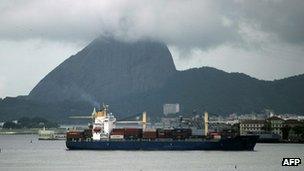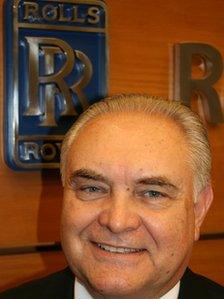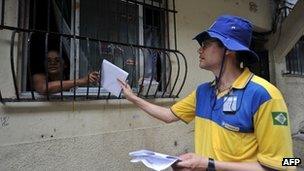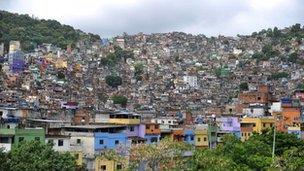Brazil's economy marching to samba beat
- Published

Brazil's exports are booming, but its economic growth is mostly fuelled by its domestic economy
Brazil's economic future appears to be as impressive as the view from Francisco Itzaina's high-rise office in downtown Rio de Janeiro.
The South American boss of engine-maker Rolls-Royce's windows provide a panoramic vantage point over the city's vast Guanabara Bay.
With cargo ships, ferries and cruise liners plying their trade on the sea, and other skyscrapers rising in the foreground, it is a picturesque sight.
The giant scale of everything is also indicative of Brazil's growing economic might.
"God blessed Brazil with huge amounts of natural resources," says Mr Itzaina.
It is blessed with minerals and fresh water, and now we have just found huge reserves of oil and gas.
"Brazil is very well placed for the future."
Domestic market
Brazil, one of the so-called Bric nations together with Russia, India and China, has seen its economy soar in recent years, with growth far outpacing the US and western Europe.
In 2010 the Brazilian economy expanded by 7.5%.
While it slowed to expected growth of 3.5% in 2011, the government of President Dilma Rousseff says this was caused by external factors, primarily the financial crisis in the eurozone hitting the wider economy.
Brazil's economic growth last year was enough to see it overtake the UK as the world's sixth-largest economy, according to economic research group the Centre for Economics and Business Research.
What helps Brazil is that its vast domestic market - it has a population of 195 million - helps shield it from any global economic storms.
This population may be dwarfed by China's 1.3 billion, but on average, Brazilians have much higher purchasing power.
Mr Itzaina says: "Brazil's exports account for between 13% and 14% of its economy, China is more like 40%. So while exports are obviously important for Brazil, and it wants to increase them, it is not dependant upon them.
With substantial oil and gas reserves continuing to be discovered off Brazil's coast in recent years, the country is now the world's ninth largest oil producer, and the government wishes to ultimately enter the top five.
Yet while at face value the Brazilian economy seems unstoppable, there are some problems that remain, notably high taxes, protectionism, weak infrastructure, corruption, crime, and poverty.
Transport boost
In Rio, the public transport network, or lack of it, is the city's most serious infrastructure problem.

Francisco Itzaina says Brazil offers great opportunities for foreign firms
The city and its 6.1 million population has just one underground train line, when it could do with 10.
As a result, traffic jams are a serious problem on the city's roads, and getting about by bus or taxi can take an age.
Thankfully, Rio's municipal council is now working hard to improve the city's public transport network ahead of Brazil hosting the 2014 World Cup, and Rio being home to the 2016 summer Olympics.
Instead of digging new underground lines, the city is creating a Bus Rapid Transport (BRT) scheme with four new dedicated bus lines.
To cover a total 150km (93 miles), the new bus routes will be inaccessible to cars, and cut journey times by more than three quarters.
Pedro Paulo Teixeira, secretary for staff at Rio's municipal council, says it is a far more cost effective project than building new underground lines.
"We are investing 4bn reals ($2.2bn; £1.4bn) in BRT, which is 10% of the cost of building a new underground network of the same length," he says.
"It is also much quicker to build a BRT system, and we hope to open the first stages in July or August of next year. No other city in Latin America will have such a system."

Pedro Paulo Teixeira says Rio's forthcoming Bus Rapid Transport scheme will transform the city
Rio's municipal council is also continuing to work with the federal government to build hundreds of new houses for the country's poor, under a nationwide scheme called My Home, My Life.
But as Mr Teixeira explains, the aim is not to force people out of Rio's many favelas or shanty towns.
"Many people want to remain in the favelas, so we are working hard to improve the facilities for those who wish to remain."
The council's efforts come as the police, backed by marines, is continuing to force out drug gangs and take control of favelas.
Mr Teixeria says: "Once the police regains control and the crime goes away, it is then the responsibility of City Hall to take over public services; everything except security."
Welfare schemes
With Brazil's continuing economic success being fuelled by the increased purchasing power of most of its population, the government estimates that 20 million people have come out of poverty in the past decade.
Ricardo Ismael, sociology professor at the Pontifical Catholic University of Rio de Janeiro, says numerous government schemes have helped achieve this.

Many of Rio's favelas are now getting services such as mail delivery for the very first time
"The efforts to reduce poverty and inequality go back to Fernando Cardoso [Brazil's president from 1995 to 2002]," says Prof Ismael.
"Cardoso's main effort was to tackle Brazil's high inflation, which has a much higher impact on the poor. This had a big effect on reducing poverty.
"President Lula [2003-2010] then had an even bigger impact, with a large rise in the minimum wage, and the introduction of Bolsa Familia."
Bolsa Familia is a social welfare programme that provides financial aid to poor families. In return, they must ensure that their children go to school and are vaccinated.
But as Prof Ismael adds, Brazilian governments have been greatly helped by external factors.
"The big growth in the global economy over the past decade has created many additional jobs in Brazil, pulling people out of poverty without the government having to do anything," he says.
"It is vital for Brazil that economic woes in the European Union do not mean Brazilians that have become middle class falling back down again."
Taxing issue
Back in Mr Itzaina's Rolls-Royce office, he says one of Brazil's main weaknesses is the country's "extremely complicated tax system".

Many people living in Rio's favelas do not wish to move elsewhere
With more than 60 different types of taxes, many are in place as effective import tariffs.
When it comes to food and consumer goods, the level of VAT varies widely, from 17% for tomatoes, up to 50% for an iPod.
Mr Itzaina adds: "Of course the tax system should be simplified and improved, but it hasn't stopped companies from coming here.
"Rolls-Royce has been in Brazil for more than 50 years, and it is a fantastic country, with tremendous opportunities for foreign firms.
"Brazil is shaking off a reputation for corruption, but Rolls-Royce has never, ever had any involvement in that.
"We are the best example that you do not need to be corrupt to prosper in this country."
- Published29 December 2011
- Published5 March 2012
- Published2 December 2011
- Published28 November 2011